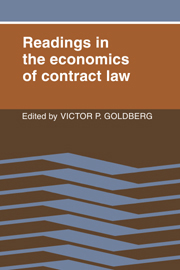Book contents
- Frontmatter
- Contents
- Preface
- Readings in the economics of contract law
- Part I Some preliminaries
- Part II Contract law and the least cost avoider
- Part III The expectation interest, the reliance interest, and consequential damages
- 3.1 The reliance interest in contract damages
- 3.2 Note on price information and enforcement of the expectation interest
- Questions and notes on protecting the property interest in the price
- 3.3 The contract–tort boundary and the economics of insurance
- 3.4 Notes on the reliance interest
- Questions and notes on fault, consequential damages, and reliance
- Part IV The lost-volume seller puzzle
- Part V Specific performance and the cost of completion
- Part VI Power, governance, and the penalty clause puzzle
- Part VII Standard forms and warranties
- Part VIII Duress, preexisting duty, and good faith modification
- Part IX Impossibility, related doctrines, and price adjustment
- Questions and notes on impossibility and price adjustment
- References
- Index of cases
- Author index
- Subject index
3.1 - The reliance interest in contract damages
Published online by Cambridge University Press: 10 November 2010
- Frontmatter
- Contents
- Preface
- Readings in the economics of contract law
- Part I Some preliminaries
- Part II Contract law and the least cost avoider
- Part III The expectation interest, the reliance interest, and consequential damages
- 3.1 The reliance interest in contract damages
- 3.2 Note on price information and enforcement of the expectation interest
- Questions and notes on protecting the property interest in the price
- 3.3 The contract–tort boundary and the economics of insurance
- 3.4 Notes on the reliance interest
- Questions and notes on fault, consequential damages, and reliance
- Part IV The lost-volume seller puzzle
- Part V Specific performance and the cost of completion
- Part VI Power, governance, and the penalty clause puzzle
- Part VII Standard forms and warranties
- Part VIII Duress, preexisting duty, and good faith modification
- Part IX Impossibility, related doctrines, and price adjustment
- Questions and notes on impossibility and price adjustment
- References
- Index of cases
- Author index
- Subject index
Summary
Why should the law ever protect the expectation interest?
In seeking justification for the rule granting the value of the expectancy … [i]t may be said that there is not only a policy in favor of preventing and undoing the harms resulting from reliance, but also a policy in favor of promoting and facilitating reliance on business agreements. As in the case of the stop-light ordinance we are interested not only in preventing collisions but in speeding traffic. Agreements can accomplish little, either for their makers or for society, unless they are made the basis for action. When business agreements are not only made but are also acted on, the division of labor is facilitated, goods find their way to the places where they are most needed, and economic activity is generally stimulated. These advantages would be threatened by any rule which limited legal protection to the reliance interest. Such a rule would in practice tend to discourage reliance. The difficulties in proving reliance and subjecting it to pecuniary measurement are such that the business man knowing, or sensing, that these obstacles stood in the way of judicial relief would hesitate to rely on a promise in any case where the legal sanction was of significance to him. To encourage reliance we must therefore dispense with its proof. For this reason it has been found wise to make recovery on a promise independent of reliance, both in the sense that in some cases the promise is enforced though not relied on (as in the bilateral business agreement) and in the sense that recovery is not limited to the detriment incurred in reliance.
- Type
- Chapter
- Information
- Readings in the Economics of Contract Law , pp. 77 - 79Publisher: Cambridge University PressPrint publication year: 1982
- 1
- Cited by



